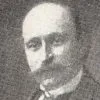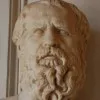I have learned yet again (this has been going on all my life) what folly it is to take anything for granted without examining it skeptically.
Joseph Jacobs (1854-1916) Australian folklorist, literary critic, historian writer
Dark Age Ahead, “Notes and Comments” (2004)
(Source)
Quotations about:
examination
Note not all quotations have been tagged, so Search may find additional quotes on this topic.
If you do not expect the unexpected, you will not find it; for it is hard to be sought out and difficult.
[ἐὰν μὴ ἔλπηται ἀνέλπιστον οὐκ ἐξευρήσει, ἀνεξερεύνητον ἐὸν καὶ ἄπορον]Heraclitus of Ephesus (c.540-c.480 BC) Greek philosopher [Ἡράκλειτος, Herákleitos, Heracleitus]
Fragment 18 [tr. Burnet (1920), DK B18]
(Source)
(Source (Greek)). Alternate translations:He who does not expect will not find out the unexpected, for it is trackless and unexplored.
[tr. Kahn (1981), VI (D. 18)]He who does not expect the unexpected will not find it out.
[tr. Kahn (1981), VI (D. 18), variant]He who does not expect the unexpected will not find it, since it is trackless and unexplored.
[tr. Allan (2008)]Unless you expect the unexpected, you will not find it, for it is hidden and thickly tangled.
[tr. Jenks (2014)]
Racism in America is like dust in the air. It seems invisible — even if you’re choking on it — until you let the sun in. Then you see it’s everywhere.
Kareem Abdul-Jabbar (b. 1947) American athlete [b. Lew Alcindor]
“Don’t understand the protests? What you’re seeing is people pushed to the edge,” op-ed, Los Angeles Times (30 May 2020)
(Source)
Anything becomes interesting if you look at it long enough.
[Pour qu’une chose soit intéressante, il suffit de la regarder longtemps.]
Gustave Flaubert (1821-1880) French writer, novelist
Letter to Alfred Le Poittevin (16 Sep 1845)
(Source)
Alt. trans.: "To make something interesting, just look at it for a long time."
Read the bible then, as you would read Livy or Tacitus. The facts which are within the ordinary course of nature you will believe on the authority of the writer, as you do those of the same kind in Livy and Tacitus. The testimony of the writer weighs in their favor in one scale, and their not being against the laws of nature does not weigh against them. But those facts in the bible which contradict the laws of nature, must be examined with more care, and under a variety of faces. Here you must recur to the pretensions of the writer to inspiration from god. Examine upon what evidence his pretensions are founded, and whether that evidence is so strong as that it’s falshood would be more improbable than a change of the laws of nature in the case he relates For example in the book of Joshua we are told the sun stood still several hours. Were we to read that fact in Livy or Tacitus we should class it with their showers of blood, speaking of statues, beasts &c., but it is said that the writer of that book was inspired. Examine therefore candidly what evidence there is of his having been inspired. The pretension is entitled to your enquiry, because millions believe it. On the other hand you are Astronomer enough to know how contrary it is to the law of nature that a body revolving on it’s axis, as the earth does, should have stopped, should not by that sudden stoppage have prostrated animals, trees, buildings, and should after a certain time have resumed it’s revolution, and that without a second general prostration. Is this arrest of the earth’s motion, or the evidence which affirms it, most within the law of probabilities?
Thomas Jefferson (1743-1826) American political philosopher, polymath, statesman, US President (1801-09)
Letter (1787-08-10) to Peter Carr
(Source)
It seems to me what is called for is an exquisite balance between two conflicting needs: the most skeptical scrutiny of all hypotheses that are served up to us and at the same time a great openness to new ideas. Obviously those two modes of thought are in some tension. But if you are able to exercise only one of these modes, whichever one it is, you’re in deep trouble.
If you are only skeptical, then no new ideas make it through to you. You never learn anything new. You become a crotchety old person convinced that nonsense is ruling the world. (There is, of course, much data to support you.) But every now and then, maybe once in a hundred cases, a new idea turns out to be on the mark, valid and wonderful. If you are too much in the habit of being skeptical about everything, you are going to miss or resent it, and either way you will be standing in the way of understanding and progress.
On the other hand, if you are open to the point of gullibility and have not an ounce of skeptical sense in you, then you cannot distinguish useful ideas from the worthless ones. If all ideas have equal validity then you are lost, because then, it seems to me, no ideas have any validity at all.
Carl Sagan (1934-1996) American scientist and writer
“The Burden of Skepticism,” Pasadena lecture (1987)
(Source)
Reprinted in The Skeptical Inquirer (Fall 1987).
I made a comparison at table some time since, which has often been quoted, and received many compliments. It was that of the mind of a bigot to the pupil of the eye; the more light you pour on it, the more it contracts.
Oliver Wendell Holmes, Sr. (1809-1894) American poet, essayist, scholar
Article (1858-04), “The Autocrat of the Breakfast-Table,” Atlantic Monthly
(Source)
Often trimmed/paraphrased to "The mind of a bigot is like the pupil of the eye; the more light you pour upon it, the more it will contract." Frequently misattributed to his son, Oliver Wendell Holmes, Jr.
The Autocrat himself correctly comments that a similar phrase appears in Thomas Moore, Preface to the poems "Corruption" and "Intolerance":The minds of some of our statesmen, like the pupil of the human eye, contract themselves the more the stronger light there is shed upon them.
The Autocrat goes on to note, "When a person of fair character for literary honesty uses an image such as another has employed before him, the presumption is, that he has struck upon it independently, or unconsciously recalled it, supposing it his own."
Collected in The Autocrat of the Breakfast Table, ch. 6 (1858)
Examinations are formidable even to the best prepared, for the greatest fool may ask more than the wisest man can answer.
Charles Caleb "C. C." Colton (1780-1832) English cleric, writer, aphorist
Lacon: Or, Many Things in Few Words, Vol. 1, § 322 (1820)
(Source)












